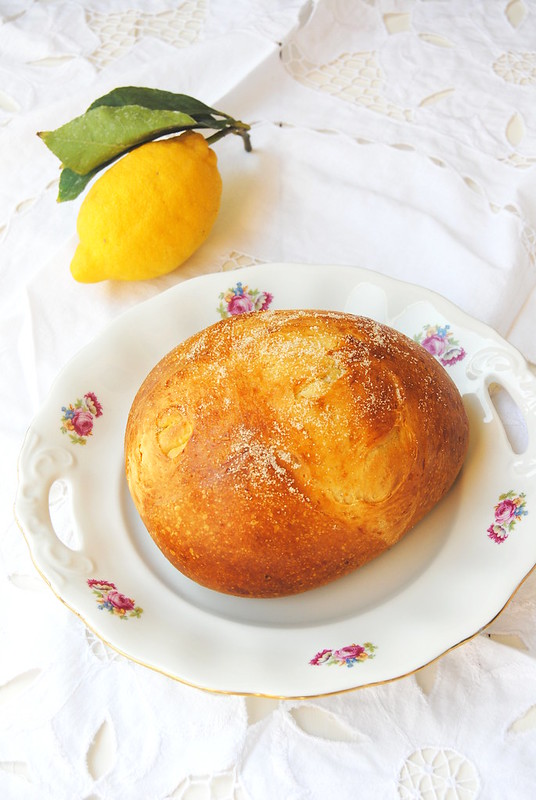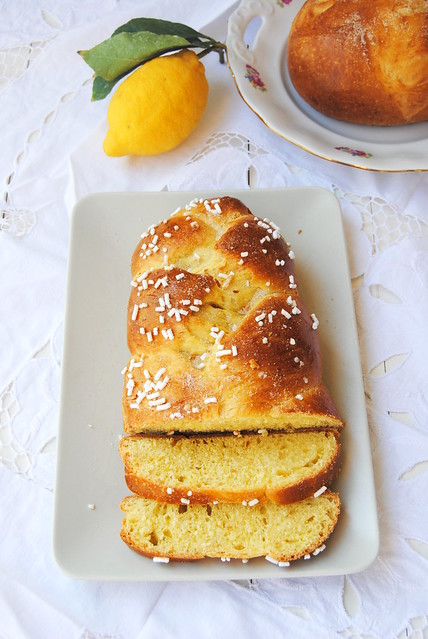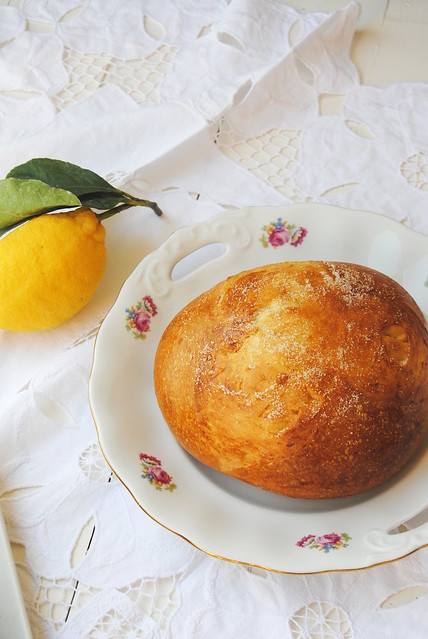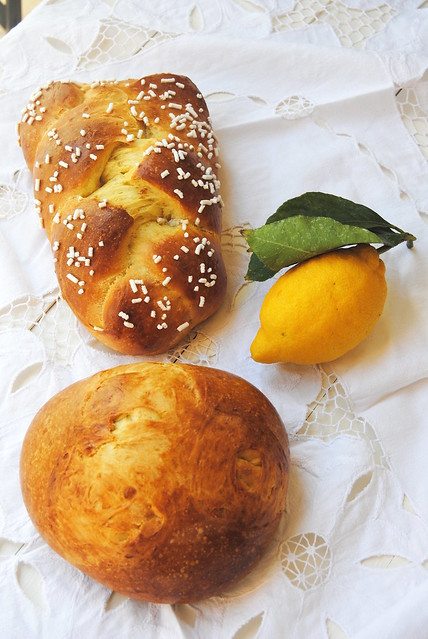Easter in Dalmatia: Pogača/Pinca/Sirnica
 |
I made Ensaimada last year (with yeast), but failed miserably this year trying to make it again with sourdough starter.
Never mind. Better luck next time. I still had several more recipes on my list.
One of them are these Sweet breads made throughout Istria and Dalmatia, Croatian regions. I am Croat of origin, but these regions are quite far from where I grew up and the Easter tradition always brought different type of sweets to our festive table.
Being curious as I always am, I decided it was time to see what these sweet breads, called in different ways Pinca, Pogača, or Sirnica, tasted like. Some said they were dry and not worth a try. Some swore the recipe they had made beautiful and moist pogača. I had to try and see it for myself.
I knew I could rely blindly on my dear Dalmatian friend's recipe that she's been preparing the same way her mother always did, so for decades I'd say.
The only thing I wanted to change was substitute the fresh yeast with sourdough starter.
I was a bit afraid. The dough is heavy with eggs and butter. There was always a risk it wouldn't rise. So in order not to waste huge quantity of ingredients in case of failure, I reduced the quantities to one third of the original recipe.
Now that they came out so beautifully, and I checked first hand they were really, really delicious, I'm sorry I didn't make at least double.
They taste like very rich, citrus and rhum scented brioche breads. Rich in flavour, but moist and far from being dry as some people suggested (I guess it depends a lot on the recipe).
So I can only say I'm really, really happy.
And I hope everyone has a Happy Easter... or Sretan Uskrs (in Croatian).
 |
Dalmatian Pogača/Sirnica/Pinca
* 80 ml milk, lukewarm
* 110 g active sourdough started (50%-hydration)
* 400 g strong flour
* 80 g butter, melted and cooled
* 1 whole medium egg
* 2 egg yolks
* 80 g sugar
* 1/2 vanilla bean, scraped seeds
* 1/2 teaspoon salt
* 50 ml rhum or limoncello or maraschino (originally a pear liquour called Kruškovac)
* 1 organic orange, finely grated zest
* 1 organic lemon, finely grated zest
* 1 egg + a little milk, for brushing
* a little rhum + caster sugar, for garnish


Feed your sourdough starter 2 or 3 times on the same day, at 4 hour distance, so it's really active and strong, it will work better in this rather heavy dough.
Once it's ready, tear or cut the sourdough starter into small pieces and mix it with lukewarm milk, stirring or whisking to dissolve it almost completely.
Melt the butter and set aside to cool.
Sift the flour into the bowl of your stand mixer. Add the milk with sourdough starter, and start mixing with the paddle attachment. Add the melted butter and continue stirring.
In a separate bowl, mix the whole egg, the egg yolks, sugar, salt, liquor, grated lemon and orange zests, scraped vanilla seeds.
Add the egg mixture to the bowl of the stand mixer and continue mixing on low speed until all the ingredients come together.
Switch to the hook attachment and knead the dough until smooth.
Transfer the dough to the kneading board and knead shortly with your hands.
Form a ball, place it in a clean bowl, cover (or seal with a piece of plastic wrap) and let rise in a warm place until doubled in size (it took me about 13 hours at 22°C, in warmer environment it would certainly rise sooner).
Transfer the dough to the kneading board and divide in two pieces, shape each the way you prefer. I made one braid - divided the dough in three pieces and shaped in thick ropes, then braided them together. And I made one traditional, round one.
Place the shaped pogacas on a baking sheet lined with baking paper. Cover them with a piece of plastic wrap and cotton cloth. Let them proof in a warm place until doubled in size (in my case 3-4 hours). When half risen, score the round pogaca(s) with a cross or three-point star section.
Preheat the oven to 170°C.
Brush the Pogacas with an egg wash (an egg slightly beaten with little milk) and bake them for 30-35 mintues.
Check them after the first 15-20 minutes, and if they are already golden brown, protect them with a piece of aluminium foil placed on top, to prevent them from burning.
Place them on a cooling rack to cool down. While still warm brush them with rhum and sprinkle with sugar.
 |
Pinza / Sirnica / Pogača Dalmata
* 80 ml di latte, tiepido
* 110 g di lievito madre, rinfrescato (al 50% di idratazione)
* 400 g di farina forte (ho usato 200 g manitoba + 200 g 0)
* 80 g di burro, fuso e fatto raffreddare
* 1 uovo medio, intero
* 2 tuorli
* 80 g di zucchero semolato
* 1/2 baccello di vaniglia, semi
* 1/2 cucchiaino di sale
* 50 ml di rhum o limoncello o maraschino (ricetta originale viene preparata con un liquore di pere, Kruškovac)
* 1 arancia non trattata, scorza finemente grattugiata
* 1 limone non trattato, scorza finemente grattugiata
* 1 uovo + un po' di latte, per spennellare
* un po' di rhum + zucchero (semolato o demerara) per cospargere le pinze cotte
Fate due o tre rinfreschi ravvicinati al vostro lievito madre (a distanza di 4 ore uno dall'altro) in modo che sia forte al momento di preparare l'impasto.
Spezzettate il lievito e fatelo sciogliere nel latte tiepido.
Fate sciogliere il burro e lasciatelo raffreddare.
Setacciate la farina nella ciotola della planetaria. Aggiungete il latte con il lievito e cominciate a mescolare con la foglia.
Aggiungete poi il burro fuso e continuate a mescolare.
In un altra ciotola mescolate l'uovo intero, i tuorli, lo zucchero e il sale, il liquore, le scorze di limone e arancia e i semi di vaniglia. Mescolate bene il tutto con le fruste elettrice o una frusta a mano.
Versate il composto di uova nella ciotola con la farina, lievito e il burro.
Quando tutti gli ingredienti si sono legati, montate il gancio e proseguite a impastare fino a ottenere un impasto liscio e incordato.
Trasferitelo sulla spianatoia e lavoratelo ancora brevemente con le mani. Formate una palla, sistematela in una ciotola pulita e copritela (coperchio o pellicola). Lasciate lievitare l'impasto fino al raddoppio (a me ci sono volute 13 ore a temp. di 22°C).
Una volta raddoppiato l'impasto, rovesciatelo sulla spianatoia e dividetelo in due. Date forma a ogni pezzo di pasta: una treccia (dividete l'impasto in tre, formate tre filoncini e intrecciateli) o una pagnottina tonda.
Sistematele le pinze sulla placca da forno rivestita con la carta da forno. Copritele con la pellicola e un telo, e lasciate raddoppiare in un luogo caldo (circa 3-4 ore). A metà lievitazione, incidete le pinze tonde con un taglio a croce o stella a tre punte.
Scaldate il forno a 170°C.
Sbattete l'uovo con poco latte e spennellate le pinze prima di infornarle.
Cuocetele per 30-35 minuti. Controllatele dopo 15-20 minuti, e se sono già di un colore bello dorato proteggetele con l'alluminio.
Una volta sfornate, lasciatele raffreddare sulla gratella. Mentre sono ancora calde spennellatele con il rum e cospargetele con lo zucchero.
 |
Dalmatinska uskršnja pogača/sirnica
*80 ml mlijeka, mlačnog
* 110 g aktivnog prirodnog kvasa/starter (s 50%-tnom hidratacijom)
* 400 g brašna za dizana tijesta
* 80 g maslaca, otopljenog i prohlađenog
* 1 cijelo (srednje veliko) jaje
* 2 žumanjka
* 80 g šećera
* 1/2 mahune vanilije
* 1/2 žličice soli
* 50 ml ruma ili limoncella ili maraschina (kao zamjena za Kruškovac koji se koristi u originalnom receptu)
* 1 neprskana naranča, sitno naribana korica
* 1 neprskani limun, sitno naribana korica
* 1 jaje + malo mlijeka, za premazati pogače
* malo ruma + kristal šećer, za posipanje pečenih pogača
Prije nego počnete s pripremom tijesta, nahranite kvas barem dva do tri puta uzastopce, na razmaku od 4 sata, da bude što aktivniji i jači.
Nakidajte kvas na komadiće i otopite ga u lagano umlačenom mlijeku.
U zdjelu za miješenje (zdjelu od stolnog miksera ako ćete mijesiti mikserom) prosijte brašno.
Dodajte kvas otopljen u mlijeku i počnite miješati lopaticom (ili spiralnim nastavcima ako koristite ručni mikser).
Dodajte zatim otopljeni i ohlađeni maslac i nastavite miješati.
U posebnu zdjelu stavite cijelo jaje, žumanjke, šećer, liker, sol, naribane korice limuna i naranče i sastrugane sjemenke vanilije. Umutite sve kratko mikserom ili ručnom pjenjačom da se sjedine, pa ulijte polako u zdjelu u kojoj ste već počeli mijesiti brašno s mlijekom, kvasom i maslacem.
Kad su se svi sastojci povezali zamijenite lopaticu kukastim nastavkom (ili nastavite mijesiti spiralnim nastavcim ručnog miksera) i mijesite tijesto dok nije glatko i dobro povezano.
Istresite tijesto na radnu površinu i lagano ga još premijesite rukama. Oblikujte lopticu i stavite je u čistu zdjelu. Pokrijte zdjelu (poklopac ili prozirna folija), i ostavite na toplom dok se tijesto ne udvostruči (vrijeme dizanja je puno duže nego sa svježim pivskim kvascem, meni je trebalo 13 sati na otprilike 22°C koliko je trenutno temperatura u stanu).
Kad je tijesto naraslo, istresite ga na radnu površinu i podijelite na dva jednaka dijela.
Oblikujte pogače po želji - ja sam napravila jednu pletenicu i jednu okruglu.
Stavite pogače na pleh obložen papirom za pečenje, pokrijte prvo prozirnom folijom, a zatim platnenom krpom i ostavite opet na toplom da se udvostruče. Na polovici dizanja, okrugle pogače zarežite na površini u križ ili zvijezdu s tri kraka.
Zagrijte pećnicu na 170°C.
Razmutite jaje s malo mlijeka pa premažite pogače.
Stavite ih peći u zagrijanu pećnicu. Pecite ih oko 30-35 minuta.
Ako nakon 15-20 min počnu tamniti, pokrijte ih komadom aluminijske folije.
Izvadite pogače iz pećnice i stavite ih da se hlade na rešetki.
Dok su još tople premažite ih rumom i pospite šećerom.
 |
Che bella trecciona, la trovo davvero invitante. I tuoi lievitati sono sempre stupendi
ReplyDeleteè bellissima la treccia ma mi ha colpito molto la pinza, morbida e golosa,grazie cara
ReplyDeleteJako dobro i jako lijepo Dajana ! Pinca ili sirnica za Uskrs je obavezna, a ove domaće su tako lijepe i tako dobro mirišu, ja ih jednostavno obožavam !
ReplyDeletewow they look amazing and love how you explore food and culture
ReplyDelete